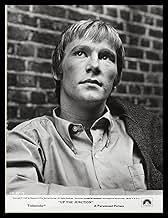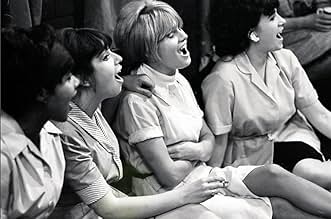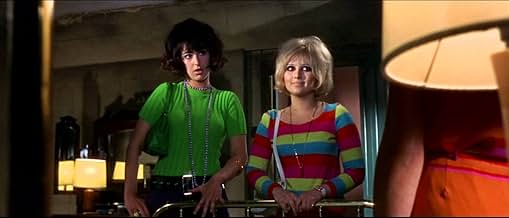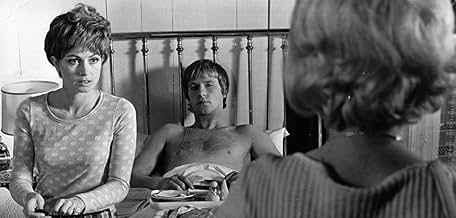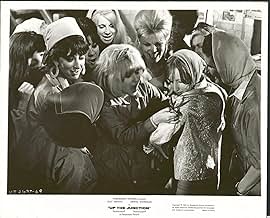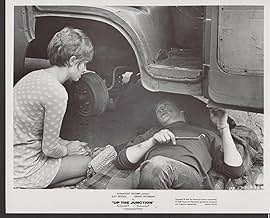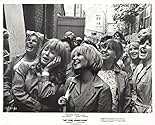CALIFICACIÓN DE IMDb
6.9/10
1.1 k
TU CALIFICACIÓN
Agrega una trama en tu idiomaAddresses some of the major 60s social issues - a bored rich London-girl from Chelsea decides to go "slumming" in depressed Battersea, getting a flat and starts factory-work and makes friend... Leer todoAddresses some of the major 60s social issues - a bored rich London-girl from Chelsea decides to go "slumming" in depressed Battersea, getting a flat and starts factory-work and makes friends... of which one has to get an illegal abortion.Addresses some of the major 60s social issues - a bored rich London-girl from Chelsea decides to go "slumming" in depressed Battersea, getting a flat and starts factory-work and makes friends... of which one has to get an illegal abortion.
- Dirección
- Guionistas
- Elenco
- Premios
- 1 nominación en total
- Dirección
- Guionistas
- Todo el elenco y el equipo
- Producción, taquilla y más en IMDbPro
Opiniones destacadas
Up The Junction was made during the Summer of 1967 though there isn't much love & peace to be found in this film. Arguably the only likeable characters are Polly, an uptown girl who's trying to slum it in Battersea, and Pete (Dennis Waterman) the 'bit of rough' she falls for, and they're not without flaws. I always loved Dennis Waterman in Minder and his character in this film could easily pass for a young Terry McCann; anyone who doubts his ability as a straight actor should watch the showdown between Pete and Polly in the hotel room. The two sisters Sylvie and Rube are sweet & bubbly on the outside but later on reveal a nasty side, especially when mocking a work colleague who appears to have learning difficulties.
Apart from Pete, all the men are depicted as selfish, sex mad and prone to violence.
Up The Junction came out a few years after the golden age of kitchen sink drama, and maybe lacks their gritty Northern humour, but there's still plenty to recommend including some lovely, sweeping London skylines, nice views of the iconic Battersea power station, and a groovy soundtrack by Manfred Mann. Anyone nostalgic for the late 1960s will probably enjoy it.
Apart from Pete, all the men are depicted as selfish, sex mad and prone to violence.
Up The Junction came out a few years after the golden age of kitchen sink drama, and maybe lacks their gritty Northern humour, but there's still plenty to recommend including some lovely, sweeping London skylines, nice views of the iconic Battersea power station, and a groovy soundtrack by Manfred Mann. Anyone nostalgic for the late 1960s will probably enjoy it.
A portrayal of women's lives in 1960s working class Battersea, through the eyes of a girl from Chelsea, hence an outsider. Based on the better known book by Nell Dunn, from which it departs significantly, making the ill-fated affair with Dennis Waterman's character the central narrative. Beautifully done. Deserves to be better known than it is.
This is one of my all time favourite films. OK so the plot is not fantastic ( certainly better than some of the same era !! ), but anyone who loves the 60's will revel in its nostalgia, the cars, the buildings, the fashions.... simply superb!, it all harks back to a much more simpler, although harder way of life. I was born in the 60's & love the 50's/60,s era, this film started my interest in films of this time, so if you love this film then also see :- A KIND OF LOVING. LONELINESS OF A LONG DISTANCE RUNNER. POOR COW. LEATHER BOYS. CATHY COME HOME. Saturday NIGHT , Sunday MORNING. SMASHING TIME. HERE WE GO ROUND THE MULBERRY BUSH. BILLY LIAR. A TASTE OF HONEY. SPARROWS CANT SING. GIRL WITH GREEN EYES. A KID FOR 2 FARTHINGS. TO SIR WITH LOVE. So close the curtains, put the cat out, turn the lights off & watch this film.... you will be hooked, i promise !
This movie had a profound effect on me when I first craned my neck to see it from the front row of the Haymarket cinema in Newcastle upon Tyne. I was sixteen years old and on date with a guy that had a rich father, a triumph spitfire and the personality of deadwood. I fell deeply in love with Suzy Kendall knowing that it should have been Dennis Waterman. I saw this movie every night for two weeks. It captures those times exquisitely, almost painfully. I just need to hear the opening theme to be transported back. The clash of cultures, the poverty on both sides of the class divide. Polly had money but was surrounded by shallowness and snobbery. Her friends up the junction had loyalty, camaraderie and fun, but struggled to survive, scamming their way from pay day to pub, who was the poorer? Manfred Mann's excellent score insinuates it's way into the fabric of the movie, haunting and evocative. Give this one a chance, you won't regret it.
A very likeable if dated view of working class 60's London viewed the eyes of upper crust Polly Dean. Several tough and controversial issues (illegal abortions & wife beating) are covered which must have been brave at the time that the film was made. Strangely prophetic in the 'gentrification' of Battersea (one of the up-areas in recent property prices). Having been in the year I was born, I cannot fully comment on the authenticity of this films view of 60's life. However from my perspective and that of older relatives it is fairly accurate. The soundtrack (by Manfred Mann) is a superb slab of sixties beat\psychedelia. The characters are very likeable and the film is in my opinion a good introduction for any scholar of the period. 9/10
¿Sabías que…?
- ErroresWhen Sylvie and Rube are singing in the pub, there are many cutaways which show the pub customers joining in the songs. On most of these, a large piece of dirt is visible at the top of the frame. Someone didn't perform the obligatory "hair in the gate" check before loading the film.
- ConexionesFeatured in Film Review: Backs British Films (1968)
- Bandas sonorasUp The Junction (Main Title)
Written by Mike Hugg and Manfred Mann
Selecciones populares
Inicia sesión para calificar y agrega a la lista de videos para obtener recomendaciones personalizadas
- How long is Up the Junction?Con tecnología de Alexa
Detalles
- Fecha de lanzamiento
- País de origen
- Idioma
- También se conoce como
- Up the Junction
- Locaciones de filmación
- Beach Hotel, Marine Parade, Worthing, West Sussex, Inglaterra, Reino Unido(hotel where Pete and Polly stay)
- Productoras
- Ver más créditos de la compañía en IMDbPro
- Tiempo de ejecución
- 1h 59min(119 min)
- Mezcla de sonido
- Relación de aspecto
- 2.35 : 1
Contribuir a esta página
Sugiere una edición o agrega el contenido que falta

